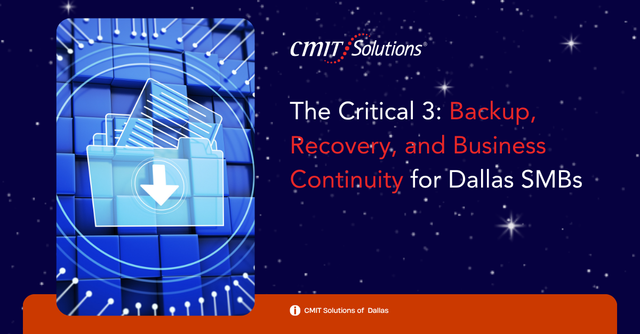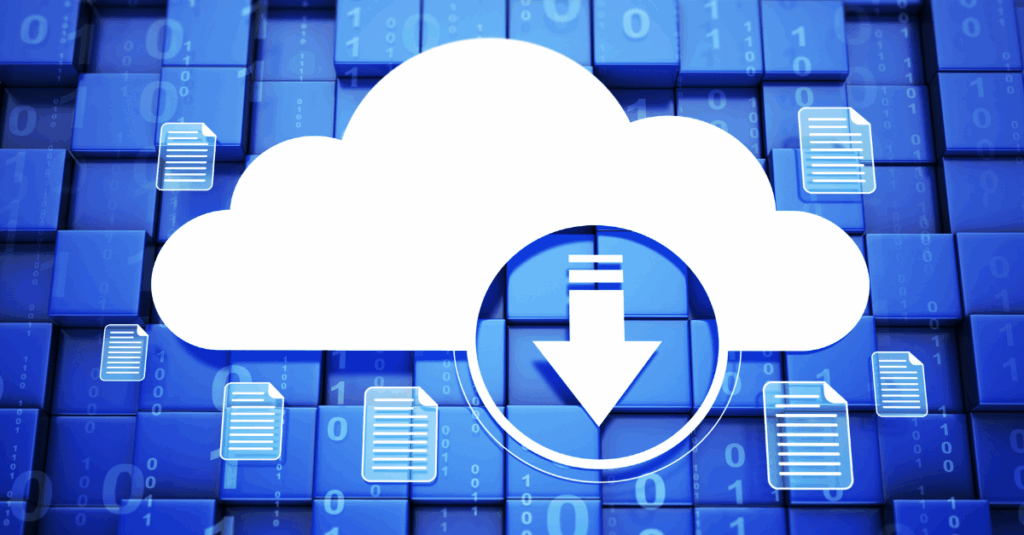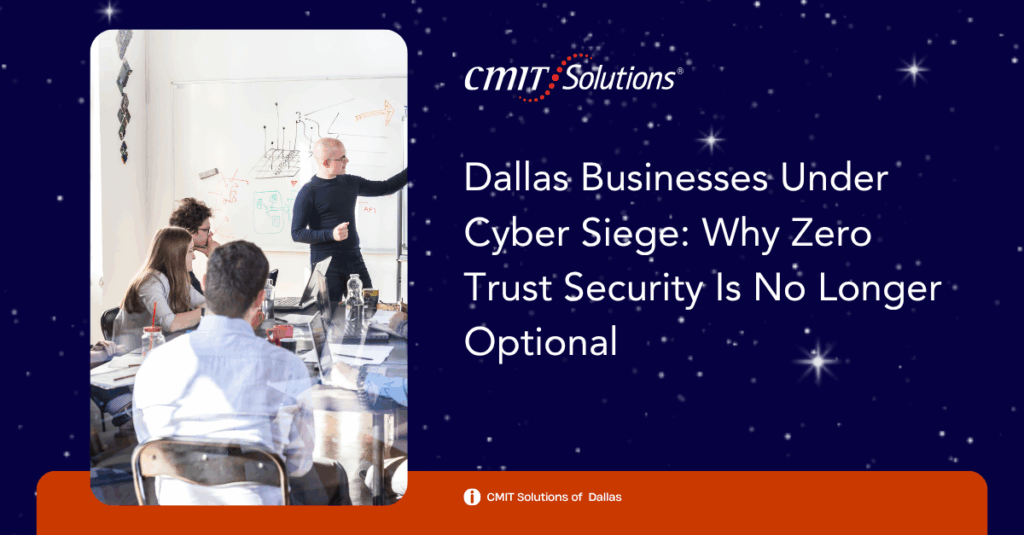In today’s fast-paced business environment, especially for small and medium-sized businesses (SMBs) in Dallas, technology plays a pivotal role in day-to-day operations. From securing sensitive data to ensuring smooth business operations, it’s essential for SMBs to have a robust strategy in place for backup, recovery, and business continuity. As cyber threats evolve and natural disasters loom, companies cannot afford to overlook these critical areas. A well-prepared business continuity plan is essential for any Dallas SMB, ensuring that you can bounce back quickly after an unexpected event.
Understanding Backup, Recovery, and Business Continuity
To start, it’s important to understand the roles that backup, recovery, and business continuity play in your business strategy.
- Backup – This refers to the process of copying and securely storing business-critical data. Backup systems are essential in case of unexpected data loss, such as a ransomware attack. A comprehensive backup strategy will allow businesses to continue operations smoothly, even if data is compromised. Dallas SMBs should prioritize cloud-based backups to ensure the security and accessibility of their data. Learn more about how hybrid cloud solutions can help businesses secure their data in our blog on cloud-smart design.
- Recovery – This is the process of retrieving data from backups to restore normal business operations. Your Recovery Time Objective (RTO) and Recovery Point Objective (RPO) help determine how quickly you can restore services and how much data loss is acceptable. For businesses in Dallas, minimizing downtime is essential to preventing significant financial losses. By implementing automated recovery tools, you can ensure that data is restored quickly, reducing the impact of an outage. To explore more about recovery solutions, read our blog on ransomware-proof backup plans.
- Business Continuity – This goes beyond just recovery. A business continuity plan ensures that essential business functions continue during and after a disaster. It includes everything from maintaining customer service to having backup staff in place. Dallas SMBs can protect themselves from operational disruptions by preparing plans that include remote work capabilities and communication strategies. By creating a comprehensive plan that addresses both IT and human resources, you’ll be ready for anything. Learn how to design effective continuity strategies in our blog on digital strategies for SMBs.
The Importance of Backup: Protecting Your Data in the Digital Age
With cyber threats at an all-time high, the importance of having a backup system in place cannot be overstated. Whether it’s a hardware failure, a ransomware attack, or an accidental deletion, having a reliable backup system ensures that your Dallas SMB won’t lose valuable data. A backup strategy goes beyond just storing data—it’s about ensuring that your systems are prepared for unexpected events.
Regular backups, especially when paired with cloud-based storage, ensure that your data is always protected. By using multiple backup methods—such as both local and cloud solutions—you provide a layer of redundancy, which is key to safeguarding your business. This strategy guarantees that your backup remains intact even if one system fails. For a deeper dive into how cloud solutions enhance backup security, read our blog on cloud-smart solutions for Dallas SMBs.
The Role of Recovery: Minimizing Downtime and Maximizing Efficiency
Having a solid backup is only one part of the equation. The next step is recovery—restoring lost data quickly and getting your systems up and running with minimal downtime. In a Dallas SMB, every minute of downtime can result in lost revenue, productivity, and customer trust. This is why defining your RTO and RPO is crucial.
Your RTO sets the goal for how quickly you need to restore operations after a disruption. It’s essential to choose a recovery system that matches your business’s need for speed. Automated recovery processes can help ensure that your systems are back online quickly, reducing recovery time significantly. For insights into the latest in automated IT systems, explore our blog on intelligent network management.
Business Continuity: The Backbone of Your Company’s Resilience
Business continuity is about ensuring that your business can keep running even when disaster strikes. It’s not just about data recovery; it’s about maintaining the flow of essential business functions—whether that’s keeping customer communications active, ensuring that your staff can still work, or maintaining access to critical applications.
A well-thought-out business continuity plan ensures that your company can continue working during emergencies. Part of the plan should include remote work capabilities, alternative communication methods, and ensuring all critical operations remain functional. You can read about creating a comprehensive business continuity plan in our blog on digital strategies for Dallas SMBs.
The Power of Proactive IT Support: A Key Component of Business Continuity
In addition to a well-designed backup and recovery system, proactive IT support is crucial for business continuity. Rather than waiting for systems to fail, SMBs should be actively monitoring their systems to identify and address potential vulnerabilities before they turn into major problems.
Proactive IT support includes regular system checks, updates, and addressing any cybersecurity risks before they can cause harm. It also involves monitoring system performance, implementing patch management, and optimizing your IT infrastructure to ensure maximum uptime. With proactive IT support, you can prevent issues that might lead to downtime, ultimately safeguarding your Dallas SMB against disruptions. Learn more about the importance of proactive support in our blog on Beyond the Break-Fix: Why Dallas Companies Need Proactive IT Support.
Compliance and Cybersecurity: Protecting Your Business from Threats
In today’s digital landscape, compliance and cybersecurity are more critical than ever for SMBs. As threats like phishing and ransomware continue to evolve, it’s essential that businesses protect themselves with a solid cybersecurity strategy. Compliance requirements also add another layer of complexity, but they are necessary for keeping your data safe and ensuring that your business is adhering to industry regulations.
Incorporating Zero Trust Architecture into your cybersecurity plan ensures that only trusted users have access to sensitive data. Regularly conducting cybersecurity audits is another step to ensure your systems are compliant with industry regulations and that your security measures are up-to-date.
A solid cybersecurity strategy helps mitigate threats and ensures your business can continue operations safely, even when faced with a cyberattack. To learn more about the latest trends in cybersecurity, explore our blog on Cybersecurity in 2025: 7 Old Rules That No Longer Work.
Understanding the Costs of Downtime: A Business Continuity Perspective
When it comes to business continuity, one of the most significant costs businesses face is downtime. For Dallas SMBs, downtime can occur for many reasons, including IT system failures, cyberattacks, or natural disasters. Each minute of downtime can cost your business revenue, damage your reputation, and impact customer satisfaction.
By implementing a business continuity plan, you can mitigate the financial impact of downtime. Having strategies in place to continue operations, such as remote work solutions and communication plans, can keep your business running even in times of crisis. Businesses that invest in continuity planning are more likely to recover faster and avoid long-term negative consequences.
For Dallas SMBs looking to optimize their downtime prevention strategies, our blog on intelligent network management offers insights into ensuring your business stays connected and secure, minimizing operational risks.
Conclusion
In conclusion, backup, recovery, and business continuity are the three pillars that every Dallas SMB should prioritize to ensure resilience and protect against potential disasters. A solid strategy will allow your business to minimize downtime, safeguard your data, and stay operational in the face of disruptions. By implementing proactive IT support and staying ahead of potential risks, your SMB will be well-prepared for any challenge.
To secure the future of your business, collaborate with an IT partner who understands your needs and can help you build a comprehensive backup, recovery, and business continuity plan.
Stay prepared, stay resilient.







